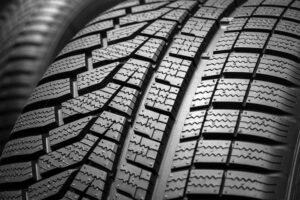Driving with winter tires in the summer in Quebec: What does the law say?
You wouldn’t drive with summer tires in winter, would you? But what about the opposite? Is it legal to drive with winter tires in the summer? In this article, our Certified Auto Repair certified technicians explain what the law says about using winter tires in the summer in Quebec.
What the law says
Since 2008, winter tires are mandatory in Quebec from December 1 to March 15 inclusively. This legislation, which is designed first and foremost to ensure the safety of all drivers during the cold season, unfortunately seems to encourage some drivers to keep their winter tires during the summer to save money. This is quite wrong! Did you know that such a decision could cost you more money in the long run and even risk your safety and that of others?

Understanding the features of winter tires
It’s important to understand that winter tires and summer tires are very different:
- Winter tires are designed with soft rubber compounds, also known as “thermo-gums”.
- Summer tires are designed with rigid rubber
During the cold season, thermo-gums retain their elasticity when the mercury falls below 7 °C, ensuring a better grip on icy roads. However, the rubber used for winter tires is not effective when exposed to heat, which greatly increases the risk of bursting, which can lead to a loss of control of the vehicle.
The dangers of winter tires in the summer
- The rubber of a winter tire disintegrates much faster.
- Wear markers appear rapidly.
- The rubber becomes too soft, and the crampons soften too easily.
- Your vehicle may waltz if you have to perform an abrupt maneuver.
In short, if your winter tires are at the end of their life and you decide to keep them in the summer to save money, aquaplaning will become a major risk at every rainstorm for you! Indeed, the sole of the winter tires on a wet pavement does not evacuate the water as effectively, and their grip is greatly reduced, thus increasing braking distance.

And what about braking?
A multitude of tests made it possible to establish that the braking distance of a winter tire versus the one of a summer tire during the summer was much higher!
The Canadian Automobile Association (CAA) in Quebec has revealed that winter tires require an average of 10% more distance than summer tires to immobilize a vehicle during the warm season and over 25% on a wet surface! That’s a considerable difference, and it goes without saying that it drastically reduces your safety and that of your passengers.
It is also important to mention that these tests were conducted at an outside temperature of 20 °C with new tires. The distances would be even greater during warmer weather and combined with used tires.
What you need to remember
There is simply no good reason to keep your winter tires all year round. Both for road safety and economic reasons!
If you have new tires, you would use them too quickly and have to buy new ones faster. If the tires are used, you risk your road safety and that of others. Still not convinced? The noise of winter tires on summer roads is unbearable. Give yourself a break!
A final argument: in Quebec, using winter tires during the summer can lead to increased resistance on the road surface, which in turn results in higher fuel consumption. And with today’s wildly fluctuating gas prices, we’re convinced this is a compelling argument!

One last tip
Rotating between winter and summer tires is essential for ensuring optimal safety on the road and enhancing your vehicle’s overall performance.
Think of it this way: you can’t wait to change your winter boots for your new running shoes once summer arrives? Do not deprive your vehicle of that same joy!
Plan your next tire change today to ensure you comply with current Quebec legislation. As a reminder, winter tires are mandatory between December 1 and April 15.
And for tire-changing services performed by certified technicians, visit one of our 5,000 Certified Auto Repair repair shops located across North America. Find your nearest repair shop using our repair shop locator.
SOURCES :
http://www.pagesjaunes.ca/trucs/pourquoi-il-est-risque-de-garder-ses-pneus-dhiver-toute-lannee/
http://conseils.norauto.fr/peut-on-rouler-avec-des-pneus-hiver-en-ete/
http://guideauto.com/et-les-pneus-a-neige-en-ete/jacques-duval
